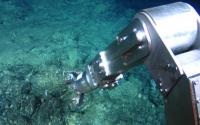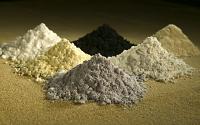Revision of Deep seabed mining has potential to cause significant environmental damage and should be regulated from Tue, 02/03/2015 - 21:21
Deep seabed mining could have serious impacts on the ocean environment and the future livelihoods and well being of coastal communities. An international, multi-sector approach to management and protection, similar to that under development by the International Seabed Authority under UNCLOS, is needed, if we are to ensure the health and sustainable use of our oceans.
Quicktabs: Arguments

Once thought too expensive and too difficult, commercial scale mining of the deep sea is poised to become a reality as early as 2019. But scientists warn reaching rare minerals on and under the sea floor could cause irreversible damage to an environment that is still poorly understood.
[ More ]
Researchers have discovered previously unknown species of sea life on the deep seabed floor, prompting concerns about how they will be impacted by the rush to mine the seabed for cobalt, manganese and other elements for use in technologies such as smartphones and electric cars.
[ More ]
The rush to exploit the riches of the deep ocean and seafloor is beginning. As pollution, overfishing and climate change sap the productivity of surface waters, many countries and companies are scouting new territory deeper down. This presents a threat the deep ocean has never faced.
[ More ]
The “new global gold rush” over deep-sea mining holds the same potential pitfalls as previous resource scrambles, with environmental and social impacts ignored and the rights of Indigenous people marginalised, a paper in the Harvard Environmental Law Review has warned.
[ More ]
Our growing demand for resources has prompted companies to turn to mining in the depths of the oceans. With help from robots, a team of German scientists is racing to map the potential environmental damage.
[ More ]
Biodiversity losses from deep-sea mining are unavoidable and possibly irrevocable, an international team of 15 marine scientists, resource economists and legal scholars argue in a letter published today in the journal Nature Geoscience.
[ More ]
A new gold rush is targeting rich ores on the ocean floor containing valuable metals needed for smartphones and green technologies, but also hosting exotic ecosystems, raising questions about whether deep seabed mining is really an ecologic alternative to land-based mining.D
[ More ]
A new international study has demonstrated that deepsea nodule mining will cause long-lasting damage to deepsea life. This study, led by scientists at the National Oceanography Centre (NOC) in the U.K., was the first to review all the available information on the impacts of small-scale sea-floor disturbances simulating mining activity.
[ More ]
An international group of marine scientists published an article in Science in which they outlined the desperate need for an international effort to regulate the ocean floor, in order to preserve the deep sea's unique and largely uncharted ecosystems. The article came in response to the growing threat to these ecosystems from commercial deep sea activities, particularly deep sea mining.
[ More ]
Deep seabed mining for the rare earth minerals necessary for electronic devices like smartphones will expose deep dwelling sea creatures and their fragile ecosystems to new dangers from mining operations.
[ More ]